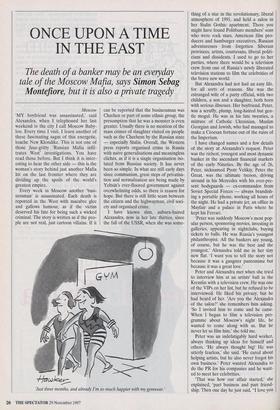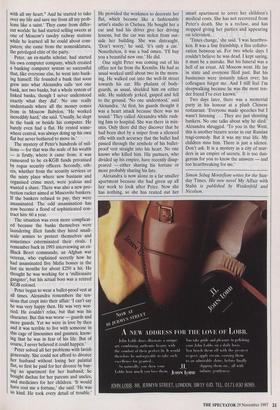ONCE UPON A TIME IN THE EAST
The death of a banker may be an everyday tale of the Moscow Mafia, says Simon Sebag Montefiore, but it is also a private tragedy
Moscow `MY boyfriend was assassinated,' said Alexandra, when I telephoned her last weekend in the city I call Moscow Baby- lon. Every time I visit, I learn another of these fascinating sagas of this energetic, louche New Klondike. This is not one of those faux-gritty 'Russian Mafia infil- trates West' investigations. You have read those before. But I think it is inter- esting to hear the other side — this is the woman's story behind just another Mafia hit on the last frontier where they are dividing up the spoils of the world's greatest empire.
Every week in Moscow another 'busi- nessman' is assassinated. Each death is reported in the West with macabre glee and gallows humour, as if the victim deserved his fate for being such a wicked criminal. The story is written as if the peo- ple are not real, just cartoon villains. If it can be reported that the businessman was Chechen or part of some ethnic group, the presumption that he was a monster is even greater. Usually there is no mention of the mass crimes of slaughter visited on people such as the Chechens by the Russian state — especially Stalin. Overall, the Western press reports organised crime in Russia with naive generalisations and meaningless clichés, as if it is a single organisation iso- lated from Russian society. It has never been so simple. In what are still early days since communism, great steps of privatisa- tion and normalisation are being made by Yeltsin's ever-floored government against overwhelming odds, so there is reason for hope. But there is still little seam between the citizen and the highwayman, civil soci- ety and organised crime.
I have known slim, auburn-haired Alexandra, now in her late thirties, since the fall of the USSR, when she was some- Just three months, and already I'm so much happier with my gymwear.' thing of a star in the revolutionary, liberal atmosphere of 1991, and held a salon in her Stalin Gothic apartment. There you might have found Politburo members' sons who were rock stars, American film pro- ducers and hamburger executives, Russian adventuresses from forgotten Siberian provinces, artists, courtesans, liberal politi- cians and dissidents. I used to go to her parties, where there would be a television crew from one of Russia's newly liberated television stations to film the celebrities of the brave new world.
But Alexandra had not had an easy life, for all sorts of reasons. She was the estranged wife of a party official, with two children, a son and a daughter, both born with serious illnesses. Her boyfriend, Peter, was a scruffy, plump, long-haired but gen- tle mogul. He was in his late twenties, a mixture of Catholic Ukrainian, Muslim Georgian and Jewish, who had managed to make a Croesan fortune out of the ruins of the Imperium.
I have changed names and a few details of the story at Alexandra's request. Peter was the richest, youngest and most dynamic banker in the ascendant financial markets of the early Nineties. By the age of 26, Peter, nicknamed Pyotr Velikiy, Peter the Great, was the ultimate tycoon, driving around in his Mercedes with his ever-pre- sent bodyguards — ex-commandos from Soviet Special Forces — always brandish- ing a portable phone, working all hours of the night. He had a private jet, an office in Mayfair and a palace in Paris where he kept his Ferrari.
`Peter was suddenly Moscow's most pop- ular person, sponsoring movies, investing in galleries, appearing in nightclubs, buying tickets to balls. He was Russia's youngest philanthropist. All the bankers are young, of course, but he was the best and the youngest,' Alexandra told me in her tiny new flat. 'I want you to tell the story not because it was a gangster pantomime but because it was a great love.'
Peter and Alexandra met when she tried to interview him at an artists' ball in the Kremlin with a television crew. He was one of the VIPs on her list, but he refused to be interviewed. He liked his privacy, but he had heard of her. 'Are you the Alexandra of the salon?' she remembers him asking. `So I invited him to come and he came. When I began to film a television pro- gramme about Moscow's night life, he wanted to come along with us. But he never let us film him,' she told me.
Peter was an indefatigably hard worker, always thinking up ideas for himself and others. 'He always thought big! He was utterly fearless,' she said. 'He cared about helping artists, but he also never forgot his own business.' Peter wanted Alexandra to do the PR for his companies and he want- ed to meet her celebrities.
`That was how our affair started,' she explained, 'part business and part friend- ship. Then one day he just said, "I love you with all my heart." And he started to take over my life and save me from all my prob- lems like a saint.' They came from differ- ent worlds: he had started selling sweets at one of Moscow's tawdry railway stations while he learned all he could about com- puters; she came from the nomenklatura, the privileged elite of the party.
Peter, an ex-maths scholar, had started his own computer company, which created a banking computer system so successful that, like everyone else, he went into bank- ing himself. He founded a bank that soon grew into what Alexandra calls 'not one bank, not two banks, but a whole system of linked banks, though I never understood exactly what they did'. No one really understands where all the money comes from in Moscow Babylon. 'He worked incredibly hard,' she said. 'Usually, he slept in the bank or beside his computer. He barely even had a flat. He rented some- where central, was always doing up his own flat but never bothered to move in.'
The mystery of Peter's hundreds of mil- lions — for that was the scale of his wealth — is firstly, where it came from: it was rumoured to be ex-KGB funds privatised by rogue security officers. Secondly, oth- ers, whether from the security services or the misty place where new business and organised crime meet, were jealous and wanted a share. There was also a new pro- tection racket aimed at Muscovite bankers. If the bankers refused to pay, they were assassinated. The odd assassination has now become a flood of sophisticated con- tract hits: 60 a year.
The situation was even more complicat- ed because the banks themselves were laundering illicit funds: they hired small- scale armies to protect themselves and sometimes exterminated their rivals. I remember back in 1993 interviewing an ex- Black Beret commando, an Afghan war veteran, who explained secretly how he had assassinated five Mafia bosses in the last six months for about £250 a hit. He thought he was working for a 'millionaire gangster', but his actual boss was a retired KGB colonel.
Peter began to wear a bullet-proof vest at all times. Alexandra remembers the ten- sions that crept into their affair: 'I can't say he was very happy then. He was very wor- lied. He couldn't relax, but that was his character. But this was worse — guards and more guards. Yet we were in love by then and it was terrible to live with someone in this cage of limousines and gunmen, know- ing that he was in fear of his life. But of course, I never believed it could happen.'
Peter solved all her problems with lavish generosity. She could not afford to divorce her husband without losing her palatial Fat, so first he paid for her divorce by buy- ing an apartment for her husband; he bought dachas for her parents and uncles, and medicines for her children. 'It would have cost me a fortune,' she said. 'He was so kind. He took every detail of trouble.' He provided the workmen to decorate her flat, which became like a fashionable artist's studio in Chelsea. He bought her a car and had his driver give her driving lessons, but the car was stolen from out- side her building. She was distraught. `Don't worry,' he said, 'it's only a car,' Nonetheless, it was a bad omen. buy you a beautiful new one.' He did.
One night Peter was coming out of his office not far from the Kremlin. He had as usual worked until about two in the morn- ing. He walked out into the well-lit street towards his car. His phalanx of body- guards, as usual, shielded him on either side. He suddenly jerked, gasped and fell to the ground. 'No one understood,' said Alexandra. 'At first, his guards thought it was a heart attack because there was no sound.' They called Alexandra while rush- ing him to hospital. She was there in min- utes. Only there did they discover that he had been shot by a sniper from a silenced rifle with such accuracy that the bullet had passed through the armhole of his bullet- proof vest straight into his heart. No one knows who killed him. His partners, who divided up his empire, have recently disap- peared — either sharing his fortune or more probably sharing his fate.
Alexandra is now alone in a far smaller apartment because she had given up all her work to look after Peter. Now she has nothing, so she has rented out her smart apartment to cover her children's medical costs. She has not recovered from Peter's death. She is a recluse, and has stopped giving her parties and appearing on television.
`Times change,' she said. 'I was heartbro- ken. It was a fine friendship, a fine collabo- ration between us. For two whole days I couldn't believe he was dead. I kept saying, it must be a mistake. But his funeral was a hell of an event. All Moscow went. He lay in state and everyone filed past. But his businesses were instantly taken over; his colleagues forgot me. And I still feel I'm sleepwalking because he was the most ten- der friend I've ever known.'
Two days later, there was a memorial party in his honour at a plush Chinese restaurant. 'Everyone made speeches but I wasn't listening . . . They are just shooting bankers. No one talks about why he died.' Alexandra shrugged. 'To you in the West, this is another bizarre scene in our Russian tragi-comedy. But it was my true life. My children miss him. There is just a silence. Don't ask. It is a mystery in a city of mur- ders in an empire of secrets. It is too dan- gerous for you to know the answers — and too heartbreaking for me.'
Simon Sebag Montefiore writes for the Sun- day Times. His new novel My Affair with Stalin is published by Weidenfeld and Nicolson.



















































































 Previous page
Previous page